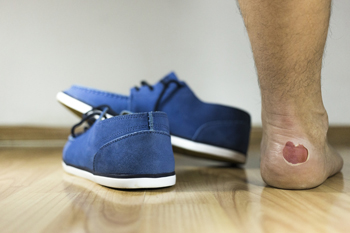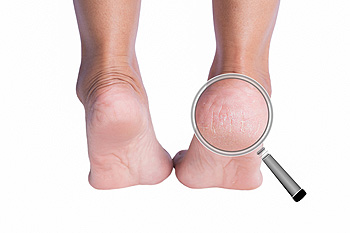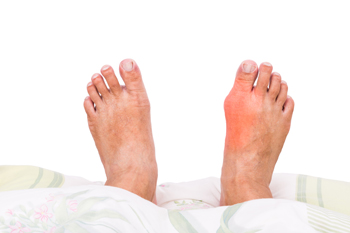Items filtered by date: November 2018
Causes of Blisters on the Feet
 One of the main reasons blisters on the feet may develop is from friction that may typically come from wearing shoes and socks that are too tight. They appear as a small area filled with fluid, which is a natural protectant of the skin, and will commonly develop as a result of an injury or infection that has occurred. When a blister develops on the foot, pain and discomfort will generally accompany this ailment and can possibly be treated by placing a cover over it while wearing shoes. There may be several additional reasons why blisters may form on the feet. These may include being exposed to freezing temperatures, which may cause frostbite, or the opposite may be true when the skin endures an extreme sunburn. If you have an allergic reaction to an insect bite or to a specific chemical, unsightly blisters may form to protect the skin as the healing process occurs. If you are experiencing blisters on the feet, it is suggested to speak with a podiatrist for information about treatment options.
One of the main reasons blisters on the feet may develop is from friction that may typically come from wearing shoes and socks that are too tight. They appear as a small area filled with fluid, which is a natural protectant of the skin, and will commonly develop as a result of an injury or infection that has occurred. When a blister develops on the foot, pain and discomfort will generally accompany this ailment and can possibly be treated by placing a cover over it while wearing shoes. There may be several additional reasons why blisters may form on the feet. These may include being exposed to freezing temperatures, which may cause frostbite, or the opposite may be true when the skin endures an extreme sunburn. If you have an allergic reaction to an insect bite or to a specific chemical, unsightly blisters may form to protect the skin as the healing process occurs. If you are experiencing blisters on the feet, it is suggested to speak with a podiatrist for information about treatment options.
Blisters may appear as a single bubble or in a cluster. They can cause a lot of pain and may be filled with pus, blood, or watery serum. If your feet are hurting, contact Dr. Ronald Sheppard of Warren-Watchung Podiatry Center. Our doctor can provide the care you need to keep you pain-free and on your feet.
Foot Blisters
Foot blisters are often the result of friction. This happens due to the constant rubbing from shoes, which can lead to pain.
What Are Foot Blisters?
A foot blister is a small fluid-filled pocket that forms on the upper-most layer of the skin. Blisters are filled with clear fluid and can lead to blood drainage or pus if the area becomes infected.
Symptoms
(Blister symptoms may vary depending on what is causing them)
- Bubble of skin filled with fluid
- Redness
- Moderate to severe pain
- Itching
Prevention & Treatment
In order to prevent blisters, you should be sure to wear comfortable shoes with socks that cushion your feet and absorb sweat. Breaking a blister open may increase your chances of developing an infection. However, if your blister breaks, you should wash the area with soap and water immediately and then apply a bandage to the affected area. If your blisters cause severe pain it is important that you call your podiatrist right away.
If you have any questions, please feel free to contact one of our offices located in Marlboro and Watchung, NJ . We offer the newest diagnostic and treatment technologies for all your foot care needs.
Causes of Cracked Heels
 Patients who experience the painful condition known as cracked heels are often aware of the discomfort this condition may cause. There may be several reasons why people may develop cracked heels, including standing for extended periods of time, which may put excess pressure on the heels, wearing shoes that have an open back or a thin sole, or medical conditions such as eczema or dermatitis. Symptoms of this ailment may include deep cracks that are known as fissures, in addition to the formation of calluses as a result of the thickened skin on the heels. There are several effective treatments that may be implemented to bring moderate relief. These may include washing and drying the feet thoroughly, followed by utilizing a good moisturizer daily, wearing shoes that have adequate padding, and using a pumice stone, which may aid in exfoliating the dead skin. If you have developed cracked heels, it is suggested to speak with a podiatrist who can properly guide you to correct treatment options.
Patients who experience the painful condition known as cracked heels are often aware of the discomfort this condition may cause. There may be several reasons why people may develop cracked heels, including standing for extended periods of time, which may put excess pressure on the heels, wearing shoes that have an open back or a thin sole, or medical conditions such as eczema or dermatitis. Symptoms of this ailment may include deep cracks that are known as fissures, in addition to the formation of calluses as a result of the thickened skin on the heels. There are several effective treatments that may be implemented to bring moderate relief. These may include washing and drying the feet thoroughly, followed by utilizing a good moisturizer daily, wearing shoes that have adequate padding, and using a pumice stone, which may aid in exfoliating the dead skin. If you have developed cracked heels, it is suggested to speak with a podiatrist who can properly guide you to correct treatment options.
Cracked heels are unsightly and can cause further damage to your shoes and feet. If you have any concerns, contact Dr. Ronald Sheppard from Warren-Watchung Podiatry Center. Our doctor can provide the care you need to keep you pain-free and on your feet.
Cracked Heels
Cracked heels appear unappealing and can make it harder for you walk around in sandals. Aside from looking unpleasant, cracked heels can also tear stockings, socks, and wear out your shoes. There are several methods to help restore a cracked heel and prevent further damage.
How Do You Get Them?
Dry skin is the number one culprit in creating cracked heels. Many athletes, walkers, joggers, and even swimmers suffer from cracked heels. Age and skin oil production play a role to getting cracked heels as well.
Promote Healing
Over the counter medicines can help, especially for those that need instant relief or who suffer from chronic dry feet.
Wear Socks – Wearing socks with medicated creams helps lock in moisture.
Moisturizers – Applying both day and night will help alleviate dryness which causes cracking.
Pumice Stones – These exfoliate and remove dead skin, which allows for smoother moisturizer application and better absorption into the skin.
Change in Diet
Eating healthy with a well-balanced diet will give the skin a fresh and radiant look. Your body responds to the kinds of food you ingest. Omega-3 fatty acids and zinc supplements can also revitalize skin tissue.
Most importantly, seek professional help if unsure how to proceed in treating cracked heels. A podiatrist will help you with any questions or information needed.
If you have any questions, please feel free to contact one of our offices located in Marlboro and Watchung, NJ . We offer the newest diagnostic and treatment technologies for all your foot care needs.
Foot Conditions Resulting from Aging Feet
 Research has shown that the feet of elderly people may develop foot conditions as the aging process occurs. This may be a result of a loss of cushioning that is found in the feet, in addition to changes in the toenails and skin. It’s important to wear shoes that are comfortable and fit properly, which may include eliminating high heels or shoes that have inadequate room for the toes to move about in. Circulation may improve when gentle foot stretches are performed throughout the day, in addition to wearing socks that are not too tight. There are several common ailments that may be prevalent to aging feet, including Athlete’s foot, cracked heels, and the formation of corns and calluses. Many seniors may become afflicted with the uncomfortable condition known as ingrown toenails, which may be a result of the toenails being cut improperly. Please consult with a podiatrist about effective techniques to properly care for elderly feet.
Research has shown that the feet of elderly people may develop foot conditions as the aging process occurs. This may be a result of a loss of cushioning that is found in the feet, in addition to changes in the toenails and skin. It’s important to wear shoes that are comfortable and fit properly, which may include eliminating high heels or shoes that have inadequate room for the toes to move about in. Circulation may improve when gentle foot stretches are performed throughout the day, in addition to wearing socks that are not too tight. There are several common ailments that may be prevalent to aging feet, including Athlete’s foot, cracked heels, and the formation of corns and calluses. Many seniors may become afflicted with the uncomfortable condition known as ingrown toenails, which may be a result of the toenails being cut improperly. Please consult with a podiatrist about effective techniques to properly care for elderly feet.
Proper foot care is something many older adults forget to consider. If you have any concerns about your feet and ankles, contact Dr. Ronald Sheppard from Warren-Watchung Podiatry Center. Our doctor can provide the care you need to keep you pain-free and on your feet.
The Elderly and Their Feet
As we age we start to notice many changes in our body, but the elder population may not notice them right away. Medical conditions may prevent the elderly to take notice of their foot health right away. Poor vision is a lead contributor to not taking action for the elderly.
Common Conditions
- Neuropathy – can reduce feeling in the feet and can hide many life-threatening medical conditions.
- Reduced flexibility – prevents the ability of proper toenail trimming, and foot cleaning. If left untreated, it may lead to further medical issues.
- Foot sores – amongst the older population can be serious before they are discovered. Some of the problematic conditions they may face are:
- Gouging toenails affecting nearby toe
- Shoes that don’t fit properly
- Pressure sores
- Loss of circulation in legs & feet
- Edema & swelling of feet and ankles
Susceptible Infections
Diabetes and poor circulation can cause general loss of sensitivity over the years, turning a simple cut into a serious issue.
If you have any questions please feel free to contact one of our offices located in Marlboro and Watchung, NJ . We offer the newest diagnostic and treatment technologies for all your foot and ankle needs.
Intense Pain May Accompany Gout
 An excess of uric acid levels in the blood may lead to a painful condition known as gout. When the body has difficulty in processing this buildup, crystals will typically form in the joint of the big toe. It is often considered to be a form of arthritis, and may cause considerable pain and discomfort. This ailment may develop as a result of ingesting foods that are rich in purines, which may often include red wine, seafood or chocolate. Research has shown there may be several predispositions for gout to occur. People who have high blood pressure or who have abnormal kidney functions may be at a greater risk to develop this ailment. Patients who are afflicted with gout are aware of the intense pain, swelling and redness that accompanies this predicament. If you have developed gout it's suggested to consult with a podiatrist who can provide valuable information about the treatment of this debilitating condition.
An excess of uric acid levels in the blood may lead to a painful condition known as gout. When the body has difficulty in processing this buildup, crystals will typically form in the joint of the big toe. It is often considered to be a form of arthritis, and may cause considerable pain and discomfort. This ailment may develop as a result of ingesting foods that are rich in purines, which may often include red wine, seafood or chocolate. Research has shown there may be several predispositions for gout to occur. People who have high blood pressure or who have abnormal kidney functions may be at a greater risk to develop this ailment. Patients who are afflicted with gout are aware of the intense pain, swelling and redness that accompanies this predicament. If you have developed gout it's suggested to consult with a podiatrist who can provide valuable information about the treatment of this debilitating condition.
Gout is a foot condition that requires certain treatment and care. If you are seeking treatment, contact Dr. Ronald Sheppard from Warren-Watchung Podiatry Center. Our doctor will treat your foot and ankle needs.
What Is Gout?
Gout is a type of arthritis caused by a buildup of uric acid in the bloodstream. It often develops in the foot, especially the big toe area, although it can manifest in other parts of the body as well. Gout can make walking and standing very painful and is especially common in diabetics and the obese.
People typically get gout because of a poor diet. Genetic predisposition is also a factor. The children of parents who have had gout frequently have a chance of developing it themselves.
Gout can easily be identified by redness and inflammation of the big toe and the surrounding areas of the foot. Other symptoms include extreme fatigue, joint pain, and running high fevers. Sometimes corticosteroid drugs can be prescribed to treat gout, but the best way to combat this disease is to get more exercise and eat a better diet.
If you have any questions please feel free to contact one of our offices located in Marlboro and Watchung, NJ . We offer the newest diagnostic and treatment technologies for all your foot and ankle needs.
